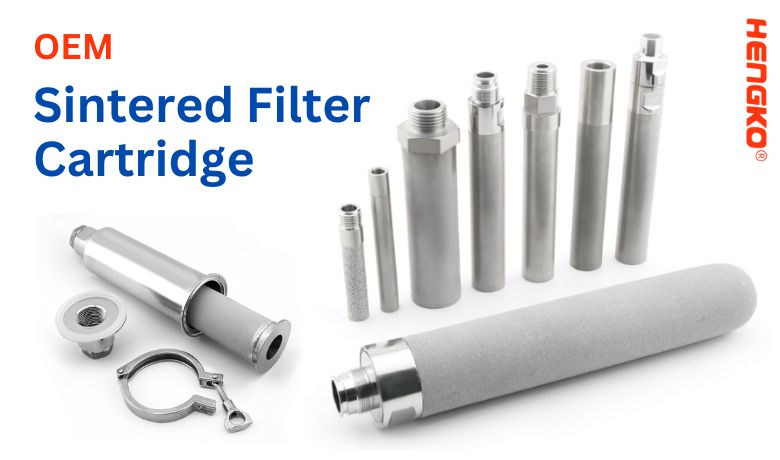-
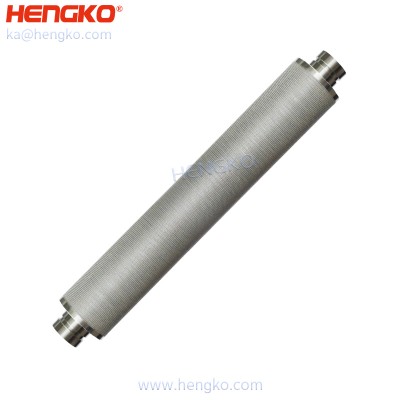
Micro powder sintered 304 316L stainless steel industrial dust collector oil filter car...
Candle filters and porous tubes are long, cylindrical filters with thin walls, i.e. they have a high length-to-diameter ratio. The cylinders can be hollow or...
View Detail -
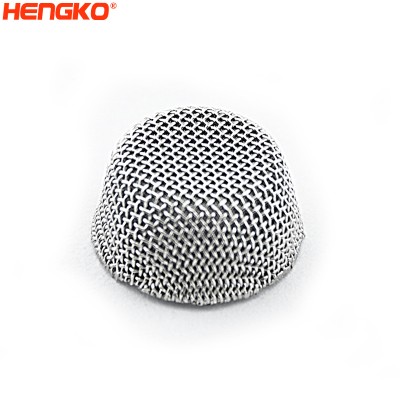
sintered stainless steel wire mesh air filter cartridge for dust removal or pure water
Sinter wire mesh filters are usually used for purification and filtration of liquid and gas, separation and recovery of solid particles, transpiration coolin...
View Detail -
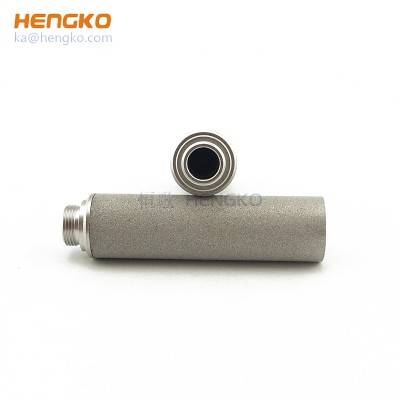
precision sintered micron porous metal bronze SS 316 stainless steel filter candle powd...
Product Describe HENGKO stainless steel filter elements are made by sintering 316L powder material or multilayer stainless steel wire mesh at high temperatur...
View Detail -
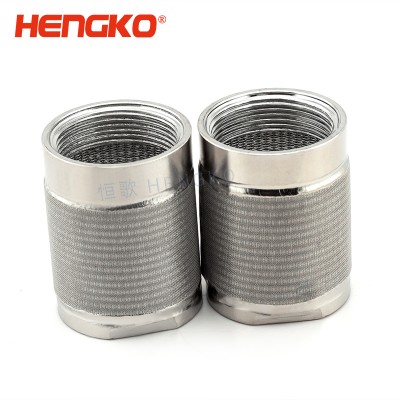
micron sintered 316L stainless steel single cartridge filter for oil water treatment
Sintered wire mesh filters are usually used for purification and filtration of liquid and gas, separation and recovery of solid particles, transpiration cool...
View Detail -
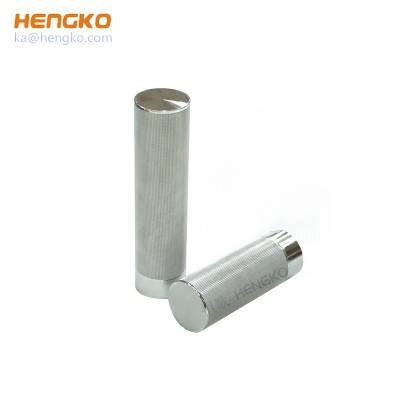
Candle type Sintered 316L stainless steel mesh filter reusable cartridge
HENGKO offers an extensive collection of stainless steel filter cartridges that are tailored for use in a broad range of industries, including petrochemicals...
View Detail -
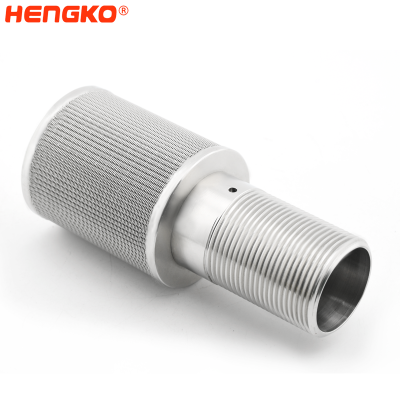
5 40 micron sintered stainless steel porous metal fuel oil/air/dust filter wire mesh ca...
Sinter wire mesh filters are usually used for purification and filtration of liquid and gas, separation and recovery of solid particles, transpiration coolin...
View Detail -
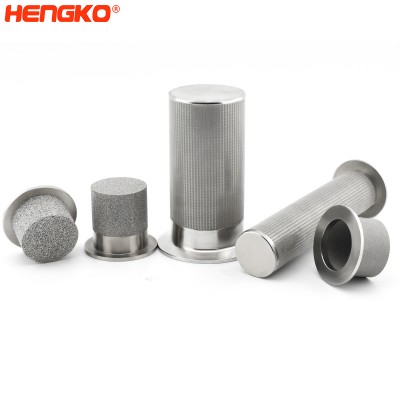
1.0-100um sintered porous metal stainless steel cartridge filter mesh perform in liquid...
Sinter wire mesh filters are usually used for purification and filtration of liquid and gas, separation and recovery of solid particles, transpiration coolin...
View Detail -
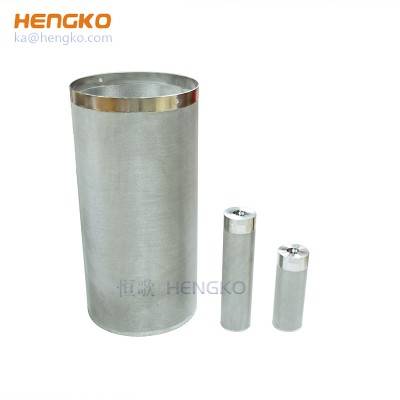
Anti-corrosion Microns Powder Porous Sintered Metal Filter Cartridge For Filtration System
HENGKO creates porous filter tubes that offer versatility in design as they can be hollow or blind with a minimum wall thickness of 1mm. These products are c...
View Detail -
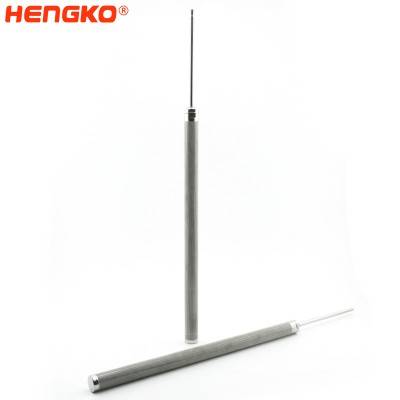
Sintered Filter Cartridges for Medical Filtration Applications -HENGKO
HENGKO has developed an all-metal sterilizing grade membrane for medical filtration applications. This material is ideally suited for applications in medical...
View Detail
What is Sintered Filter Cartridge ?
A sintered filter cartridge is a type of filtration device made through a process called sintering.
Here's a more detailed explanation:
Sintering Process
Sintering involves heating a powdered material (often metal or ceramic) below its melting point until the particles adhere to each other. The result is a solid structure with interconnected pores. The size and distribution of these pores can be controlled during the sintering process, allowing for customization based on the desired filtration requirements.
Sintered Filter Cartridge
The sintered filter cartridge is essentially a porous filter made from sintered materials. These cartridges are designed to filter out contaminants from fluids or gases passing through them. The interconnected pores in the sintered material act as a barrier, trapping and removing particles based on the size of the pores.
Advantages
1. Durability: Sintered filter cartridges are known for their strength and durability, often outlasting other types of filters.
2. Heat Resistance: Due to their manufacturing process, they can withstand high temperatures.
3. Customizable Pore Size: The sintering process allows for precise control over pore size, making it possible to target specific particle sizes for filtration.
4. Chemical Resistance: Many sintered materials are resistant to a wide range of chemicals, making these filters suitable for various applications.
Applications Sintered filter cartridges are used in a variety of industries, including petrochemical, pharmaceutical, food and beverage, and more. They are ideal for applications where high temperatures, corrosive environments, or precise filtration requirements are present.
In summary, a sintered filter cartridge is a robust and versatile filtration device made from materials that have been heated and fused together without melting, resulting in a porous structure ideal for filtering out contaminants.
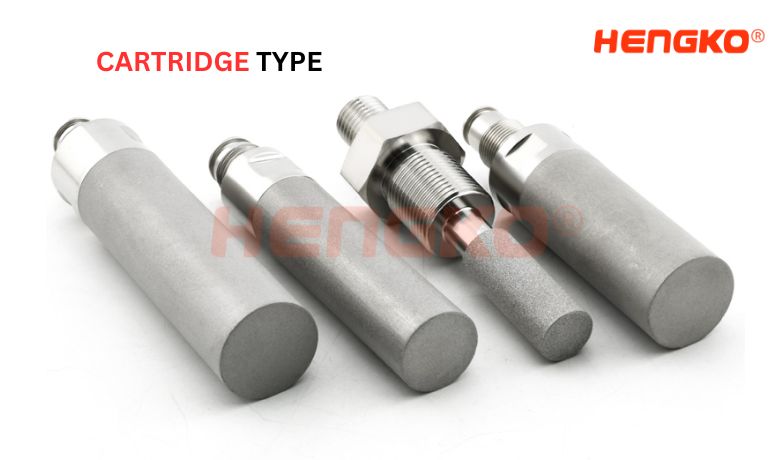
Main Features of Sintered Metal Filter Cartridge ?
1. High Strength & Durability:
Due to the sintering process, these cartridges exhibit excellent mechanical strength, making them resistant to physical stresses and ensuring a long service life.
2. Uniform Pore Size Distribution:
The sintering process allows for precise control over the pore size, ensuring consistent filtration performance throughout the cartridge.
3. Heat Resistance:
Sintered metal filter cartridges can operate effectively at high temperatures, making them suitable for applications where other filter materials might degrade or fail.
4. Corrosion Resistance:
Many metals used in sintering, such as stainless steel, offer resistance to corrosion, ensuring the cartridge remains effective even in aggressive chemical environments.
5. Back Washable & Cleanable:
These cartridges can often be cleaned and reused, either through backwashing or other cleaning methods, extending their operational lifespan and reducing replacement costs.
6. High Filtration Efficiency:
Due to their uniform pore structure, sintered metal filters can effectively remove particles even at the micron and sub-micron levels.
7. Broad Chemical Compatibility:
Sintered metal cartridges are compatible with a wide range of chemicals, making them versatile for various industrial applications.
8. High Pressure Resistance:
The inherent strength of sintered metal allows these cartridges to withstand high differential pressures without deformation or failure.
9. Low Pressure Drop:
The porous structure of the sintered metal ensures efficient flow with minimal resistance, leading to a lower pressure drop across the filter.
10. Configurable Design:
Sintered metal filter cartridges can be customized in terms of length, diameter, and other design parameters to fit specific requirements.
In summary, sintered metal filter cartridges offer a combination of strength, durability, and precision filtration, making them a preferred choice for many demanding industrial applications. Their ability to withstand harsh conditions while delivering consistent performance sets them apart from other filtration solutions.
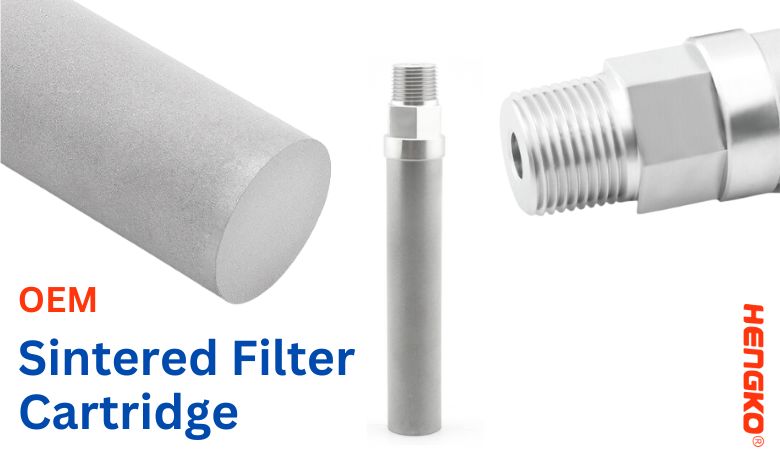
Types of Sintered Filter Cartridge ?
There are many different types of sintered filter cartridges, each with its own unique properties and applications.
Here are some of the most common types you should know :
1. Sintered metal mesh filter cartridges:
These cartridges are made by sintering metal powder into a mesh-like structure. main feature
are strong and durable, and they can be used to filter a wide range of fluids, including liquids, gases,
and oils. Sintered mesh filters are available in a variety of pore sizes, from very fine to very coarse.
2. Sintered felt filter cartridges:
These cartridges are made by sintering metal fibers into a felt-like material. They are less strong than
sintered mesh cartridges, but they are more efficient at capturing small particles. Sintered felt filters are
often used to filter liquids and gases that contain high levels of sediment.
3. Pleated sintered filter cartridges:
These cartridges are made by pleating a layer of sintered metal mesh or felt. Pleating increases the
surface area of the filter, which allows it to capture more particles without clogging. Pleated sintered filters
are often used in high-flow applications.
4. Depth sintered filter cartridges:
These cartridges are made by sintering metal powder into a solid block with a graded pore structure.
The pores are larger on the outside of the block and smaller on the inside. This allows depth sintered filters
to capture a wide range of particle sizes in a single pass.
The type of sintered filter cartridge that is right for you will depend on a number of factors, including
the type of fluid you are filtering, the size of the particles you need to remove, the flow rate, and the
pressure drop.
Function of sintered metal filter cartridge ?
The primary function of a sintered metal filter cartridge is to filter and separate particles or contaminants from fluids (liquids or gases).
However, its specific functionalities can be broken down as follows:
1. Particle Filtration:
The interconnected porous structure of the sintered metal effectively traps and removes particles based on the size of the pores.
This ensures that only particles smaller than the pore size can pass through, providing precise filtration.
2. Fluid Distribution:
In certain applications, the sintered metal filter cartridge is used to distribute fluids evenly across a particular area, ensuring uniform flow rates and preventing channeling.
3. Gas Diffusion:
In some industrial processes, sintered metal filters are used to diffuse gases uniformly, ensuring a consistent gas flow, which is critical in applications like fuel cells.
4. Backwash Cleaning:
The robust nature of sintered metal allows for backwashing, where the flow is reversed to dislodge and remove trapped particles, thereby cleaning the filter for reuse.
5. Protection:
In systems with sensitive components, the filter cartridge acts as a protective barrier, preventing larger particles or contaminants from reaching and potentially damaging these components.
6. Catalyst Support:
In chemical processes, sintered metal filters can serve as a support structure for catalysts, allowing for reactions to occur on their surface while ensuring that the catalyst remains in place.
7. Venting and Gas Release:
The porous structure can be used to vent gases from systems or containers while preventing the ingress of contaminants.
8. Heat and Mass Transfer:
Due to their high thermal conductivity, sintered metal filters can play a role in heat transfer applications, aiding in processes like cooling or heating.
In essence, the sintered metal filter cartridge serves as a multifunctional tool in various industrial applications, primarily focusing on the filtration and separation of particles from fluids, but also offering a range of other functionalities depending on the specific application.
Sintered stainless steel or stainless steel mesh,
What kind of sintered metal filter cartridge you should choose ?
When choosing between sintered stainless steel and stainless steel mesh for a metal filter cartridge, the decision largely depends on the specific requirements of the application. Both materials have their own advantages and limitations. Here's a comparison to help you make an informed choice:
Sintered Stainless Steel Filter Cartridge:
1. Uniform Pore Size: Sintered stainless steel offers a consistent and uniform pore size, which ensures precise filtration.
2. High Strength & Durability: The sintering process provides the filter with enhanced mechanical strength, making it resistant to physical stresses.
3. Heat Resistance: Sintered stainless steel can operate effectively at high temperatures.
4. Backwashable & Cleanable: These cartridges can be cleaned and reused, extending their operational lifespan.
5. High Filtration Efficiency: Effective at removing particles even at the micron and sub-micron levels.
6. Broad Chemical Compatibility: Suitable for a wide range of chemicals due to its corrosion resistance.
Stainless Steel Mesh Filter Cartridge:
1. Flexible Design: Mesh designs can be easily altered to achieve different filtration levels.
2. Lower Cost: Generally, stainless steel mesh filters are less expensive than sintered stainless steel filters.
3. Easier Inspection: The mesh structure can be visually inspected for clogs or damages more easily than sintered materials.
4. Less Pressure Drop: Mesh filters often have a more open structure, leading to a lower pressure drop across the filter.
5. Limited Filtration Precision: Mesh filters might not be as precise in filtration as sintered filters, especially at very small particle sizes.
Which to Choose?
1. For Precise Filtration: If your application requires precise filtration at the micron or sub-micron level, sintered stainless steel is the better choice.
2. For High-Temperature Applications: Sintered stainless steel's heat resistance makes it more suitable for high-temperature environments.
3. For Budget Considerations: If cost is a significant factor, stainless steel mesh might be the more economical option.
4. For Easier Maintenance: If you prefer a filter that can be visually inspected and cleaned more easily, stainless steel mesh might be preferable.
In conclusion, the choice between sintered stainless steel and stainless steel mesh for a metal filter cartridge depends on the specific needs of your application. Consider factors like filtration precision, temperature resistance, budget, and maintenance requirements to make the best decision.
FAQs
1. What is the primary function of a sintered filter cartridge?
The primary function of a sintered filter cartridge is to filter and separate particles or contaminants from fluids, be it liquids or gases. Made through a process called sintering, these cartridges have a porous structure that traps and removes particles based on the size of the pores. They are used in various industries, from petrochemical to pharmaceutical, due to their precision, durability, and ability to withstand harsh conditions.
2. How does a sintered filter cartridge work?
The working principle of a sintered filter cartridge is based on its porous structure. When a fluid (liquid or gas) is passed through the cartridge, particles larger than the pore size get trapped on the filter's surface or within its pores. Only particles smaller than the designated pore size can pass through, ensuring effective filtration. The uniformity of the pores, achieved through the sintering process, guarantees consistent filtration performance.
3. How is a sintered filter cartridge installed in a filtration system?
Installation procedures can vary based on the design of the filtration system. However, generally:
- Ensure the system is off and depressurized.
- Open the filter housing and remove any old cartridge.
- Check the new sintered filter cartridge for any visible damages.
- Insert the cartridge into the housing, ensuring it fits snugly and correctly.
- Close the housing, turn on the system, and check for any leaks.
- Regularly monitor the pressure drop across the filter to determine when cleaning or replacement is needed.
4. Can sintered filter cartridges be cleaned and reused?
Yes, one of the advantages of sintered filter cartridges is their ability to be cleaned and reused. Depending on the contamination level, they can be backwashed (reversing the flow to dislodge trapped particles), or in some cases, cleaned with appropriate solvents or chemicals. The cleaning method will depend on the type of contaminants and the filter's material.
5. What materials are commonly used in sintered filter cartridges?
While stainless steel is a popular choice due to its durability and resistance to corrosion, other materials like bronze, titanium, and various alloys can also be used based on the application's requirements. The choice of material will influence the filter's chemical compatibility, temperature resistance, and mechanical strength.
6. How long does a sintered filter cartridge typically last?
The lifespan of a sintered filter cartridge depends on several factors, including the type of fluid being filtered, the concentration of contaminants, operating conditions, and cleaning frequency. While these filters are known for their durability, it's essential to monitor them regularly. A significant increase in pressure drop or reduced flow rate can indicate that the filter is clogged and needs cleaning or replacement.
7. Are there any safety or regulatory considerations when using sintered filter cartridges?
Yes, especially in industries like food processing, pharmaceuticals, or drinking water treatment, the filter cartridges must meet specific safety and regulatory standards. It's essential to ensure that the filter material and any coatings or treatments are safe for the intended application and won't leach harmful substances into the fluid.
When considering a sintered filter cartridge for your system, it's crucial to understand its functionalities, working principles, and maintenance requirements.
By doing so, you can ensure optimal performance and longevity of the filter in your application.
If You are Looking for a tailored solution for your filtration system ?
Trust the experts at HENGKO. Reach out to us directly at ka@hengko.com to OEM your specialized Sintered Filter Cartridge.
Let's create the perfect solution together !
